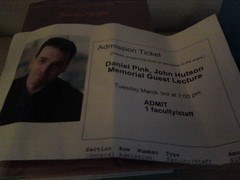 |
| Old School by alamosbasement |
With the recent interrogation of school librarians by LAUSD, the cutting of school librarians jobs across the country, and the lack of awareness of that librarians do and are knowledgeable about, as well as my participation at Lab School @ Punahou, I have been thinking about that phrase.
There are only a few librarians participating in this conference. My self, Dave Wee and sometimes Deb Peterson. The rest of the participants are subject specific teachers, a lot of whom are part of their technology integration teams. But, where are the librarians? They are discussion digital and media ethics, integrating technology into the curriculum, gamification, the filter bubble, and so many more topics, that we in the library profession have been talking about for years and have been implementing.
Whenever I go to these educator professional development programs, I always feel like the loner. I know, I am very lucky to be working at the school where I work at, have the Library Goddess as our advocate, but what about the other school librarians out there? How do we become more a part of the conversation at these conferences?
Yesterday, I actually gave a brief demo about searching for images for reuse because the copyright and fair use question came up. I had questions about how to teach kids about how to attribute and cite images properly. And at one point, one of my colleagues commented, "Wow..our librarian never even talked about this with us."
Our colleagues do not even know what it is we know!!! My eyes about popped out of my head.
We need to share, we need to be at less librarian-specific conferences, we need to get out there.


